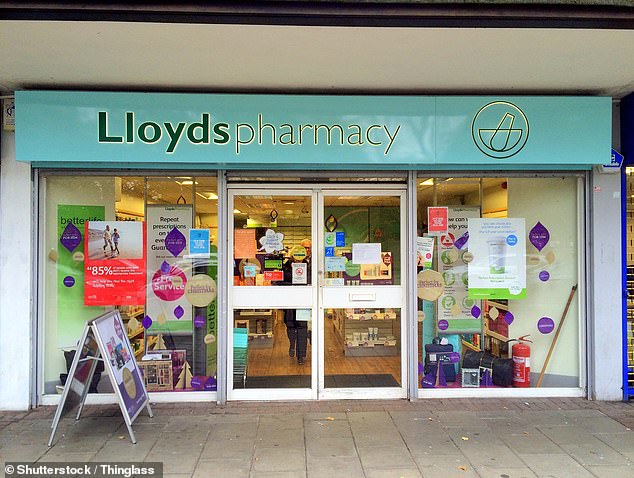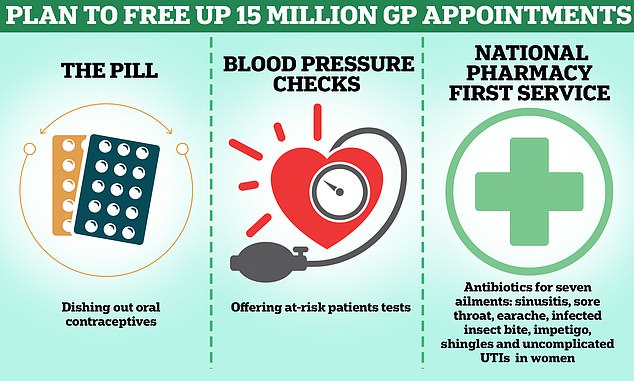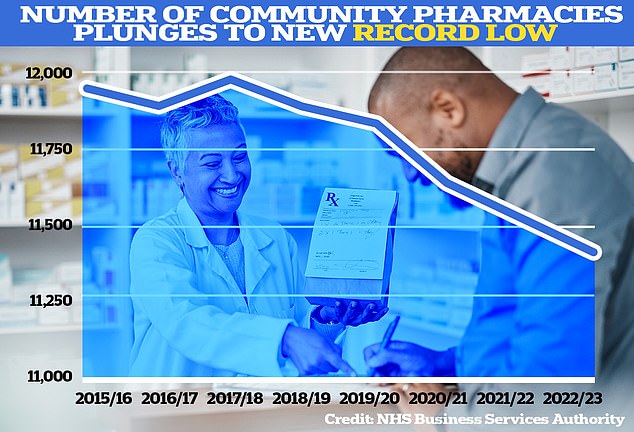Pharmacy closures are “skyrocketing” with up to 10 closing their doors each week, experts warn.
Some 177 pharmacies closed across England between January and the end of April this year, figures reveal.
Last year there were 403 pharmacy closures across the country, compared with 91 in 2022, according to analysis of official NHS data by industry body National Pharmacy Association (NPA).
The NPA said without an increase in real terms funding for pharmacies, many will have no choice but to close permanently.
The Government said it is consulting on funding and contractual arrangements for pharmacies for 2024/25.
NHS Business Services Authority data published in October shows there were just 11,414 community pharmacies remaining in England in the 2022/23 financial year.

Boots closed numerous local branches, while LloydsPharmacy closed its doors completely in January. Pictured: A Lloyds Pharmacy store in Bracknell, Berkshire.
The closures are a blow to the government’s flagship Pharmacy First programme, which gives pharmacists more powers to treat patients with a range of common conditions.
The move is expected to ease pressure on overstretched GPs.
NPA chief executive Paul Rees said: “Community pharmacies face a perfect storm of rapidly declining levels of government funding in real terms and high levels of inflation, which is driving up the cost of dispensing medicines and pushing many community pharmacies on the brink of the abyss.
‘Government funding no longer covers the country’s drug costs, leaving pharmacies to subsidize the NHS out of their own pockets.
‘Without a real increase in funding, pharmacies are faced with the choice of closing their doors or drastically reducing the service they can offer to their local communities, making it difficult for millions of people to get vital advice and medicines.
“We need a new deal that provides fair funding and ends the mass closure of community pharmacies.”
Louise Ansari, chief executive of Healthwatch England, said: “The rise in pharmacy closures in England is worrying. People tell us that pharmacies are an essential source of advice, diagnosis and treatment of minor health problems.

Under NHS plans to free up millions of GP appointments, pharmacists can now hand out contraceptive pills to women. High street pharmacists also have powers to dispense prescriptions for common ailments, meaning patients battling minor illnesses can avoid their GP. Under broader plans, pharmacists are also offering more blood pressure checks to at-risk patients, with a pledge to do 2.5 million a year by spring 2025.
“They also help reduce pressure on GPs.”
‘When a pharmacy closes, it affects communities, especially older people who are the most frequent users and those who do not have the means to travel to a pharmacy that is further away.
“The pharmaceutical sector and the health system must work together to provide the service that people need.”
A Department of Health and Social Care spokeswoman said: “More than four in five people live within a 20-minute walk of a pharmacy, and there are twice as many pharmacies in deprived areas, making access to care more fast and comfortable.”
‘We have made up to £645 million of new funding available over two years to support the expansion of community pharmacy services, including Pharmacy First, adding to the £2.6 billion a year that pharmacies already receive.
“We are also consulting with Community Pharmacy England on funding and contractual arrangements for 2024/25.”

